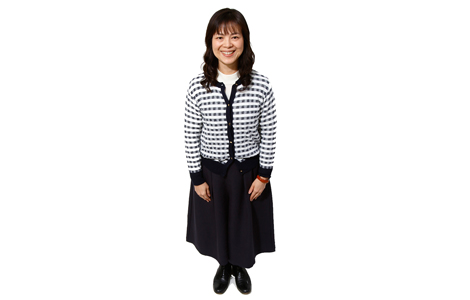DATE Hiroko

- 役職/
Position - Associate Professor at Institute of Japan Studies
- 研究分野/
Field - Japanese Language Education / Speech Prosody Education / e-Learning
The experience of seeing Japanese as a foreign language will be an asset for teaching other languages in the future
It is said that in the process of developing skills in a foreign language, the skill that is generally acquired last of all is prosody--in other words, the rhythm of how the language is spoken, such as stress and intonation. Foreign entertainers who have lived in Japan for a number of years are one of the examples. On TV show program, they demonstrate very good proficiency in Japanese and yet you may realize some awkward in their prosody. My research is focused on the teaching of such speaking and pronunciation skills in Japanese.
During my doctoral studies with an engineering-related research lab at the University of Tokyo, I was part of a team that developed the Online Japanese Accent Dictionary (OJAD), and I am still involved in its operation today. Normal written texts don't show us stress or intonation, but the OJAD allows users to display marks and other visual hints, and a synthesized voice allows users to play and listen to the text. In the master's program starting in April this year, I will be supervising a practical training course in teaching Japanese language, which will cover both Japanese students and international students. It will be interesting to think about how to incorporate OJAD into activities for learning speaking and pronunciation skills.
When I was a high school English teacher--my first job after finishing my undergraduate studies--I noticed that the students would make the same mistakes again and again. As I was exploring the possible reasons, I came across a textbook on Japanese language education which led me to a surprising realization. I noticed that in Japan we study English and other foreign languages rather analytically, but we rarely look at our own language from such an analytical perspective. This in turn gave me some hints about the elements of the Japanese language that might make it more likely for Japanese students to slip up when learning English.
I am already looking forward to the teaching practice lectures from April. I also welcome students from various language specializations and students hoping to become teachers of English or other languages to take the course. Just as I found from my experiences teaching English, seeing Japanese as a foreign language and looking at it in relation to other languages will definitely give students an asset for learning and teaching other languages and help to expand their horizons.
I joined TUFS in April 2015. It is a really stimulating environment, with as many as 27 different language programs and international students from various countries and regions. Before joining the university I spent five and a half years teaching Japanese in China, and had many opportunities to consider my identity as a Japanese person and as a Japanese teacher. I thought about what I could and couldn't do for Chinese people trying to learn Japanese, and what kind of message I should send out as a Japanese person.
The mere fact of coming into contact with foreign cultures is in itself a "stirring" experience. TUFS has such an environment to offer students, and I hope that students will try out various courses, and gain various experiences.




